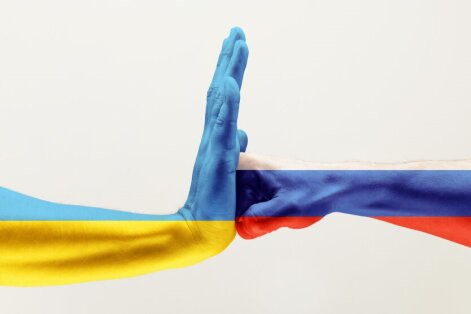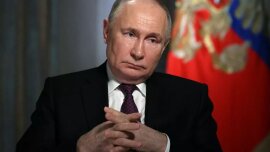I may be wrong, but the time that has passed since Biden's conversation with Putin has only increased the likelihood of a full-scale war in Ukraine. NATO cannot accept Moscow's demand to actually be handcuffed on the eastern flank. And the Kremlin has made its demands on the alliance so clear and public that Washington's lack of concrete concessions would look like Putin's personal catastrophe: Russia's elites will realize that Akela has missed.
In this situation, the parties drove themselves into Zugzwang, the most likely way out of which will be the war for Ukraine. Will the promised "hellish sanctions" stop Putin? Unlikely. Because the return of Ukraine to the orbit of the "Russian world" will demonstrate that the thirty-year global dominance of the West is in the past. That the collective West barely has (if any?) the will to defend itself, and therefore any expansion to the East should be forgotten. Following the humiliating fiasco of US attempts to democratize Afghanistan and Iraq, the "Ukrainian case" must be a turning point in returning to such a paradigm of the world as beloved Putin's paradigm of the world as zones of influence and legitimate interests of the great powers.
After all, Russia's undoubted advantage over the West is that the Kremlin is ready to send troops and risk a complete break with the West in order to tame Ukraine, and liberal democracies have already warned that they will not fight for Ukraine. Some of them will help, some - maybe, some - will not, but not a single NATO soldier will fight for our independence on the battlefield…
This is the starting point. There are only two ways out of this situation. Let's call the first Finnish way. The second is Israeli. If Ukraine makes a mistake in choosing the right path, our modern statehood may remain another episode in history textbooks. No less.
To make the right choice, let's take a closer look at each of the paths. After heroic resistance to Soviet aggression during the Winter War of 1939-40 and the return of its territories during World War II, Finland was left alone with the victorious USSR in 1944. Finnish elites understood that the war with the Soviet Army meant a catastrophic defeat, talks about the sovereign right of nations to determine their future should be postponed until better times, and the only realistic task was to preserve as much sovereignty as possible in present moment. Therefore, in March 1946 the president of Finland was replaced from the hero of the Winter War, Gustav Mannerheim with a "pigeon" (and in fact a great realist) Hugo Paasikivi. It is to him that the wise saying goes: "Awareness of the real facts is the basis of any policy."
It was during Paasikivi's ten-year tenure that the term "Finnishization" was first coined, meaning "significant restrictions on state independence imposed by a large state on its weaker neighbor" or, in other words, subordination of a small state's policy to that of its much larger (and more powerful) neighbor, with the nominal preservation of sovereignty and its own political system. Despite losing a tenth of its territory and about the same share of economic potential, the Soviet military base near Helsinki, $ 300 million in reparations and restrictions on the Finnish armed forces, the Finns signed the 1947 Paris Peace Treaty with Moscow - and won!
Finland paid reparations in 5 years, the Porkkala Peninsula (where a Soviet naval base was established after the war) was returned to Finland by the USSR in 1956 (almost 40 years earlier than the Moscow armistice), and the Soviets became the largest trading partner of a small Scandinavian country.
As Jared Diamond concludes in his best-selling book The Coup. Breakthroughs of countries in crisis: "In fact, Finnish policy towards the Soviet Union was, by necessity, Byzantinely complex. The end result was that 70 years after the end of World War II, Finland never became a Soviet or (now) Russian satellite. Instead, it has been able to slowly build ties with the West while maintaining good relations with Russia."
A clear national identity and relative cultural homogeneity of the population helped the Finns to achieve this result. The USSR could certainly have occupied Finland after World War II, but even Molotov understood that turning the Finns into "Soviet people" was unrealistic. And that's why the Finns managed to turn their country from a buffer state into a calf that sucks two mothers.
The situation with Israel was just the opposite. The only thing that connects the post-war history of the Jewish people with the history of Finland is the understanding that there is no place to wait for help. One of the chapters of Golda Meir's autobiography is called "We Are Abandoned." There are words in it that will surely surprise Ukrainians, because they concern Israel, but are painfully familiar to us: “Our worst fears have come true. London and Washington express their condolences and concerns, but are not ready to act. Like, it's a pity that this happened, but will the Arabs suddenly make noise and then calm down? We were advised to remain calm and self-controlled. ”
Unlike the USSR, the Jewish state's neighbors have long refused to recognize Israel's very right to exist. Even after losing three wars to the Israelis, their attitude toward the Jewish state was determined by three simple "noes": "no" to peace with Israel, "no" to recognition of the Jewish state, and "no" to negotiations. According to the famous Golda Meir, “We want to live. Our neighbors want to see us dead. That doesn't leave much room for compromise. " And in this case, to fight or not to fight - these are no longer options on the table. The only relevant question remains: what is the best way to fight? As the fourth Israeli prime minister summed up, “if we do not want to be pushed into the sea, we have no other options: we need to win the war. That's how we won. "
Interestingly, many people have accused Israel of what the Russians like to accuse Ukraine of: they say it is an artificial state. In a sense, it is. At some point, the Jews simply realized that statehood was not a luxury but a condition for the physical survival of the Jewish people. And by some incredible effort of will, reason and feat, hundreds of thousands of people created their own state. And then they turned it into the cornerstone of Jewish identity. And this is very reminiscent of Ukrainian history. Because all we know about ourselves is that we are Ukrainians and that our statehood is a real value. Condition of physical survival of the nation.
But unlike modern Jews, we have not yet discussed, agreed, or understood what it really means to be Ukrainian. Like Jews, we have learned to die and kill for our statehood. But in this statehood that holds the perimeter of our independence, we have not yet managed to build a real Ukrainian house. They didn't even agree on what it should be like. Unlike Israel, Ukraine's founding fathers were unlucky…
But let us return to our alternative, which Ukraine faced. There is one constant for both options: if there is a real war for Ukraine, no one but Ukrainians will fight on a real battlefield with weapons in hand. Therefore, if Russian aggression is a consequence of Moscow's security paranoia, there is room for negotiation and compromise.
By showing Moscow our teeth like the Finns in the winter of 1939-40, we can try to turn our buffering into a hub. Because we are still much more integrated at the same time with Europe and Russia than any other country. After all, having just won the American Revolutionary War, they signed a treaty of friendship, trade and navigation with the British Crown (the so-called Jay Treaty), which provided for openly discriminatory terms of bilateral relations and clearly not in favor of the newly formed federation.
But if security paranoia is just an attempt to hide the imperial phantom pains and the Russian leadership cannot accept the very existence of an independent Ukraine, as the Arabs could not (and some still cannot) accept the existence of Israel, "it leaves little room for compromise.». After all, the modern population of Ukraine is ten times bigger than the population of Finland in 1939 and 50 times bigger than the population of Israel in 1948. The remnants of the Soviet military-industrial complex are still burning in our country, and in recent years new shoots have sprouted. Unlike the Finns and the Israelis, we produce our own tanks, missiles and planes (they only had to fight for a long time with purchased weapons).
But what we lack is a functional state. We defended statehood. Instead, our state is still foreign, thieving and inefficient. Ukraine still lacks the real founding fathers - a cohort of people who are able to mobilize the people, make Ukrainians believe in a great dream and make it seem impossible. Simply because "we have no other options."
However, without an effective state organization of the people, neither the Finnish nor the Israeli options are possible. And only the "Ukrainian option" remains - desperate resistance and heroic death. And then the next century of statelessness…

























